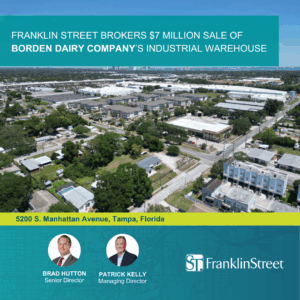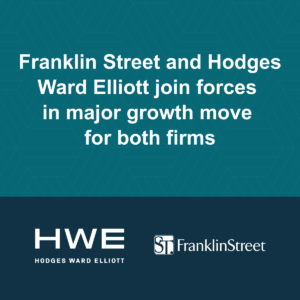Franklin Street is emerging from its first decade in business poised to apply a collaborative approach to grow its line of retail real estate services.
Franklin Street offers multiple services to investors and occupiers throughout the multifamily, office and industrial sectors. Its retail services include landlord and tenant representation, financing, insurance services, property management, investment sales, project management, valuation advisory and property appraisal.
With growth guiding every corporate move in recent years, the company has been fortifying its infrastructure to maximize a tailored approach for investors and tenants. Overall, the growing staff is concentrating on applying data in new ways and is also drawn toward the popular format of the urban-style, mixed-use property for both groups of occupiers.
The company, with approximately 300 employees, is headquartered and was founded in Tampa and has four other Florida offices in Fort Lauderdale, Jacksonville, Miami, and Orlando as well as an office in Atlanta that opened in 2010.
For the past few years, Franklin Street has been making strategic investments that specifically fuel growth. For example, a proprietary customer management system (CMS) and data mining platform known as Frankie was created internally in 2011. It allows all business teams to quickly and easily access data for a full cycle of an asset and to seamlessly share information.
And In 2015, Franklin Street updated its corporate structure, placing regional managing partners in each market and establishing presidents for each national business line.
The next chapter of business within the retail landscape is focused on taking market share from some larger competitors and opening new offices in the near future.
According to the team leading the charge, part of Franklin Street’s edge is its streamlined integration and its nimbleness navigating multiple business lines and markets by collaborating internally.
This comes in handy for clients managing assets such as mixed-use properties who might be accustomed to needing separate contacts for each use. But Franklin Street’s capabilities and collaborative structure across retail, office, and multifamily, the team says, enables single points of contact in most of their deals.
Franklin Street was founded in 2006 by real estate entrepreneur Andrew Wright and a few friends, as a mortgage services firm. A business that, as Wright puts it in a video on the company’s website, went off like a light switch during the recession.
Luckily for the company, Franklin Street’s blueprint was designed to grow multiple lines of business, and that diversification enabled it to survive the lean years with help from the launch of its insurance business at the end of 2007. The firm grew quickly from there experiencing fast revenue growth and adding more service offerings. And in 2015, Franklin Street hit a milestone of $2 billion in transaction volume.
On the landlord representation side of business, Franklin Street’s portfolio includes 12 million square feet claimed by local, regional and national clients. On the retail representation side, Franklin Street represents 70 retailers in nine states and opened 123 stores in 2016. Retail tenant transactions totaled approximately $60 million in 2016.
Among recent company news, Franklin Street arranged the $23.35 million sale of the Ovation Town Center, a 96,750-square-foot, Publix-anchored shopping center in the Davenport submarket of Orlando, Florida. The property’s strategic location approximately 10 minutes from Disney World and just south of Orlando attracted strong investor interest in the shopping center.
Ovation Town Center was built to attract shoppers to the east of Interstate 4 and the thousands of annual visitors to the nearby Reunion Resort, a 2,300-acre gated community. The deal was a prime example of Franklin Street’s collaborative services platform in action. The Tampa retail team had pushed occupancy to 93% served while serving as the center’s exclusive leasing agent. Meanwhile, the Atlanta investment sales team represented the seller in the transaction.
Franklin Street was also selected to manage leasing for Vickers in Roswell, Georgia. The community is in a historic area of Roswell and includes 79 units of multifamily and a total of about 3,800 square feet of retail and 3,000 square feet of restaurant space.
The development, opening December 2017, is near a 640-acre historic district and a walkable downtown. The project demonstrates Franklin Street’s current center of gravity in the retail universe.
A local blog says the Vickers leasing team is seeking chef-driven restaurants and regional boutiques or fitness concepts to round out the project.
“It’s an interesting retail world we’re living in right now,” says Managing Director Monetha Cobb. “Retail is in transition as we seek categories that are Amazon-proof.” Cobb says Franklin Street is perfecting how to balance the need for transactional volume with changing consumer intentions.
The recipe for a retail center that may, for example, draw customers for movies or unique restaurants, but keeps them for a mix of shops, fitness, pop-ups or events is still evolving.
“You’re seeing developers who are having to spend much more time understanding operations for restaurants and retailers than they ever did in the past,” Cobb says. “They’re having to weigh credit versus uniqueness every day. The foundation is transforming not only with how we go after new business, but also how developers are vetting potential tenants.”
Moving ahead in its retail business, Franklin Street hired Cary Beale this year as a senior vice president leading landlord management services.
Beale was formerly the vice president of leasing for DDR Corp.’s Atlanta office, but he also has experience from the retailer side, as an owner/operator of a cellular phone retailer and founder and owner of a Mongolian-style barbecue restaurant.
“Co-tenancy and how tenants complement each other is so critical to success,” Beale says. “From a landlord side, it’s very important that the leasing agent and the landlord make a game plan and strategically figure out who they want to target.”
Franklin Street is actively recruiting to grow its staff and says expansion in the Southeast is a goal as is upgrading technology and exploring new sources of data — an increasingly important driver for retailers.
“If there is one word to summarize us, it’s growth,” Cobb says. “We have spent the past couple of years really strengthening our infrastructure and leadership. We have a great foundation for what’s to come.”



